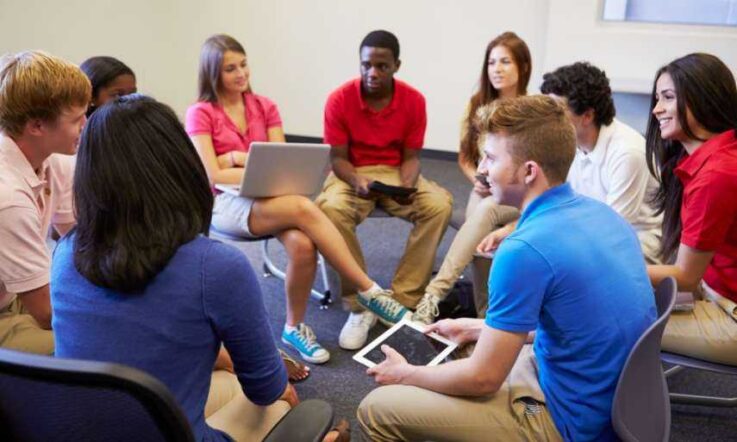Educators at Cherrybrook Technology High School in New South Wales have developed an intervention program for disengaged male students that mixes weekly lessons with intensive physical training sessions and challenges.
PE teacher Rick Pedley-Smith explains the idea for the Rite of Passage (ROP) program came about after he and colleague Wade Fairclough noticed a group of boys who were underachieving. Their attendance and behaviour was a cause for concern and they had disengaged from learning. ‘They weren't completing assignments, barely brought their laptop or books … they were a million miles away from where they should be.'
The two staff members gathered more data and information, interviewed year advisors and the stage head teacher, then spent several months creating a tailored program. After pitching their idea and securing the support of school leaders and funding from the P&C they piloted the new approach in Term 4, 2016 and throughout 2017.
‘We wanted to try and take these kids out of the classroom and work with them in a different environment and engage with them that way,' Pedley-Smith says, adding one of the big drivers was the fact he has two sons under the age of three. ‘It really made me think “how am I going to raise my boys?”, “what actually is a good man?” – and that's actually the fundamental core of the program.
‘We looked at a specific group (of 10 students) and really focused on that particular group. Wade and I take them for one period per week – so, I'll do Week A and Wade will do Week B. It's just one period because we didn't want to eat into their class time for other subjects. We've had a lot of really positive support from the other staff members.'
An important part of the program is setting high expectations. Initial ideas and plans were tweaked and adapted as the pilot progressed. The ROP lessons mainly focus on literacy and numeracy, but Pedley-Smith says it quickly became apparent that there was a need to build the students' confidence and self-esteem.
‘[To start with] we had these different ideas of doing sitting and reading for a period. We found the need was greater to address these guys' issues of their self-esteem, their actual self-concept. So, they'll either muck up or they'll do something to get removed from the classroom. We realised that this is a confidence issue at the heart of it.'
Instead of after-school detentions, ROP students take part in after-school physical training sessions with Pedley-Smith. ‘It's a pretty intensive one hour session – 45 minutes of physical training and 15 minutes of discussing “why are you here?” … “you argued this with that person – what's the better alternative, what's the better way to go about it next time?” Discussions about respectful behaviour in school are also linked to life after study and employability.
‘For the actual lessons we have an objective for each one, but they flow depending on how the boys are and how they're reacting that day. We've got to be pretty dynamic with our presentation of information and what we're trying to achieve.'
Physical exercise has been a big part of the intervention. Students and teachers worked with former commandos on training sessions looking at mindset development, regular treks and camping expeditions incorporating physical and mental challenges like abseiling. ‘We give them a physical scenario to overcome and show them – you've actually done it, you've changed your way of thinking, you saw a problem and thought about how to do it, this is what you're going to do at school, in the workforce, in your relationships. If there's a problem you've got to find a solution, you can't just blow up and use anger or fear as a mechanism to try and get out of it or overcome it.'
The inaugural ROP program culminated in a 24 hour, 50 kilometre endurance challenge in Term 4 to raise money for the Commando Welfare Trust. Each student also delivered an end-of-year presentation to school leaders, community members and P&C representatives, talking about a topic of interest. Many chose to talk about ROP and how it's helped them.
‘We've asked [teachers] to let us know how the students are progressing. Academically they are doing better … submitting work, putting effort in, having a go. It's quite scary for them to be judged on their work. The only thing they've been in trouble for over the last five months is not adhering to uniform policy.' Attendance also improved during the course of the program. By Term 4 the students were sitting above 90 per cent attendance, up from 40 per cent for some.
Pedley-Smith says the plan for 2018 is to continue to monitor the impact of ROP and apply for P&C funding to develop it further – introducing a Duke of Edinburgh challenge element and possibly introducing the program earlier, in Year 8. Students who took part in 2017 will also be invited back to act as mentors and leaders for the next cohort.
‘The important factor for these students is that they'll now be in Year 11 and will be coming back on a lot of the training days. When we go out with the commandos, the ex-special forces, they'll come with the new group and act as team leaders. They'll be coming to some of the in-class school sessions (where their timetable allows) and talking about their experiences and being mentors. One student said “the only reason I'm coming back to Year 11 next year is to be a mentor to these boys because they need it as much as I needed it” and I thought that was testament to the success of the program.'
When considering intervention programs, what information do you seek from colleagues to help inform your planning and decisions? How do you ensure other members of staff are kept in the loop? How do you monitor the impact of the program?



